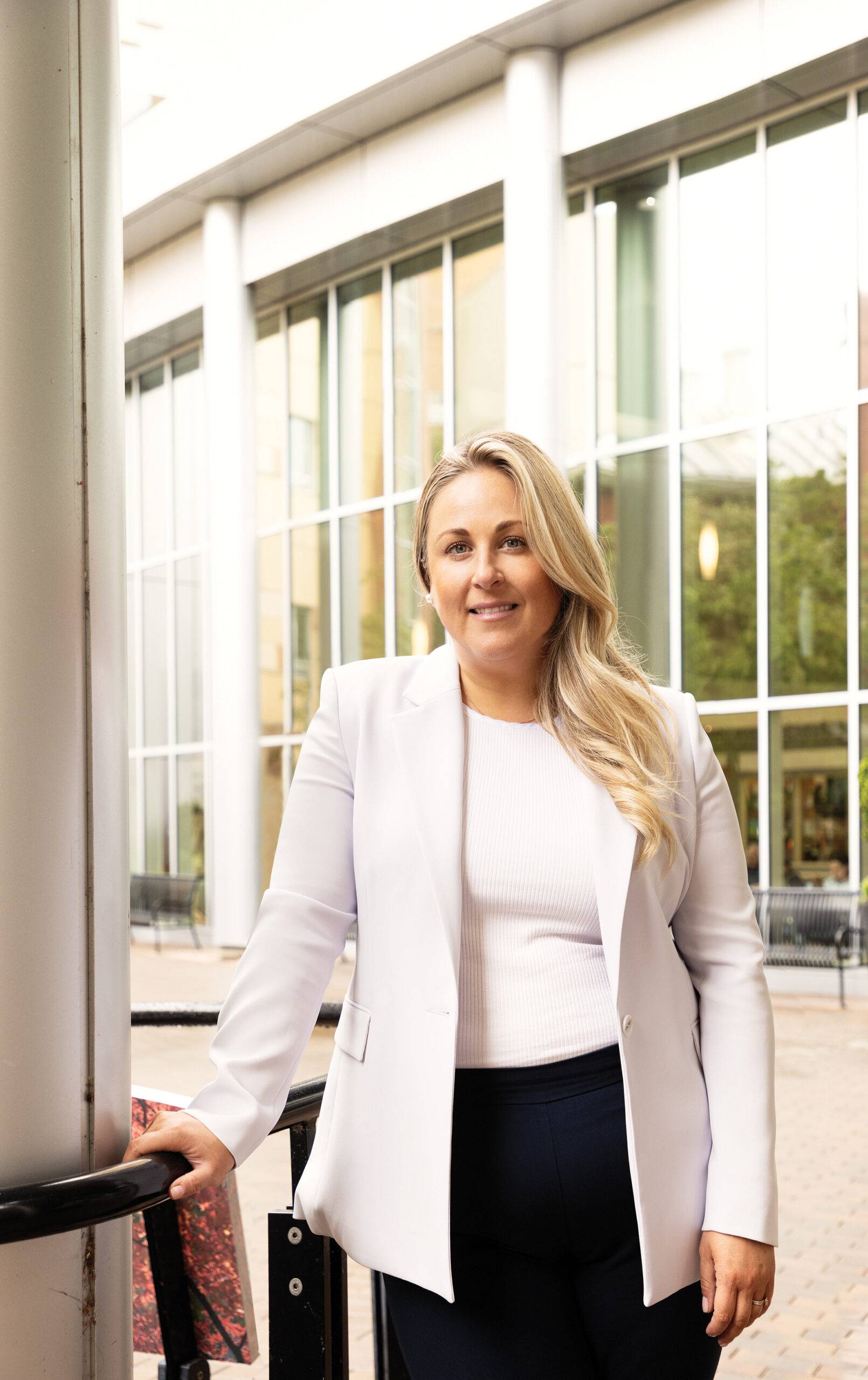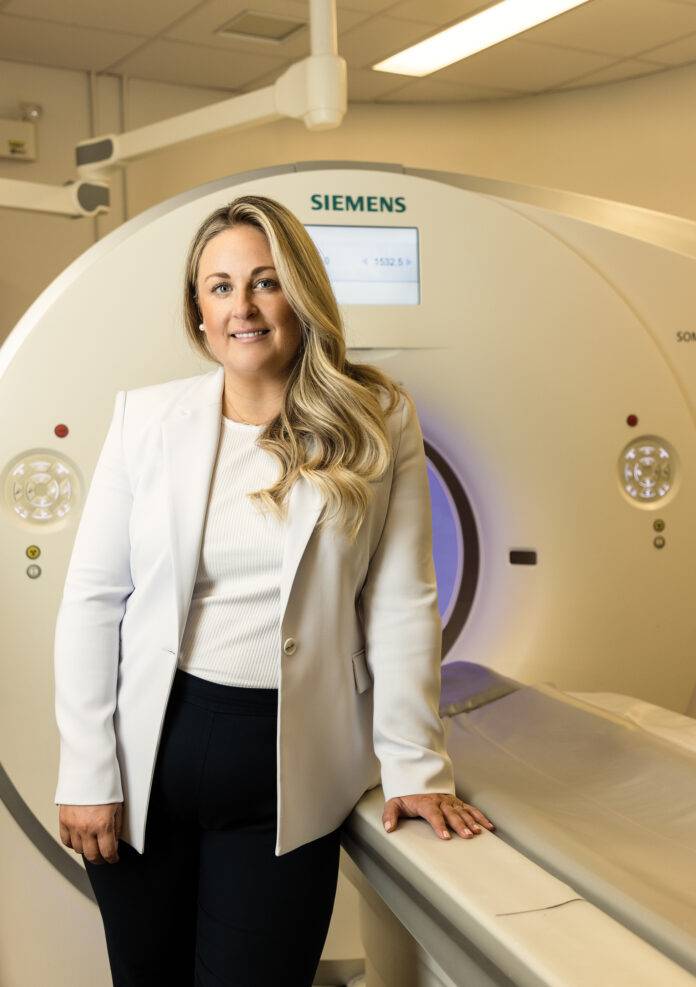Avery Brohman fell into fundraising a bit by accident.
Taking a public relations diploma at Conestoga College, near her hometown of Guelph, Ontario, she entered a co-op term with Big Brothers Big Sisters, curated a silent auction that raised $40,000 and got offered a job.
At 19, she became a full-time professional fundraiser.
“I was always intrigued with not-for-profits,” she says. “I didn’t know what that entailed, but I knew it was about helping others, about giving back … I wanted to be challenged. My no fear of asking turned out to be really beneficial.”
In 2020, Brohman was appointed CEO of the Victoria Hospitals Foundation, heading a 25-member team. The 39-year-old is privy to the very private world of Victoria money, understanding that relationships forged now will pay off in time — or through time. Many donors have been giving for more than two decades.
The Victoria Hospitals Foundation raises $15 million to $20 million annually, way up from pre-pandemic levels. Donor numbers have risen, too, up to 6,000 a year from 4,000 or so five years ago. Many, according to Brohman, were once patients who have experienced what Foundation money brings.
“Every charity should do well,” says Brohman. “When we’re all doing well this is a healthier community.”

Douglas: Was your father’s passing significant in you moving into hospital philanthropy?
Avery Brohman: It was … and health care is where I knew I wanted to be. But it wasn’t until spending five weeks with my dad in an ICU in Hamilton that I saw the care that was wrapped around him and it motivated me to look into hospital philanthropy. He passed away in 2017 and I took this job in 2018, so it was very intentional.
Douglas: How do you describe philanthropy?
Brohman: It’s a selfless act of service. A giving back to others. Being philanthropic is how you identify yourself. Do you want to give back?
Douglas: What abilities make you most effective in this job?
Brohman: I don’t have fear of rejection. I don’t take rejection personally. I, very much so, can have a vision and I see it through. There is no giving up. I work incredibly hard. I’m determined. I can juggle a lot of pieces at once.
Douglas: Have the methods of fundraising changed since you began it professionally 20 years ago?
Brohman: Digital transformation has changed the game. It’s less about meeting in person. You’ve populated the sector with digital marketing, emails, social media. You can access information anywhere now, whereas 20 years ago you were accessing it from the professional giving it to you across the table.
Douglas: Do you still find yourself at cocktail parties going face to face asking for money?
Brohman: Every week. [She laughs.] I love making personal connections. I care about authenticity. Anything you read from me at the Foundation is from me. I love human connection and that’s probably why I love my job so much. I want to walk the halls, I want to go to cocktail parties, I want to meet for lunch. Relationships are like my love language.
Douglas: Why do hospitals need private investment when they’re funded by taxpayers?
Brohman: The government will fund basic health care, but if a community is demanding more, philanthropy is the only channel to advance to excellent. The role of philanthropy in a hospital setting has been around a very long time. Every single hospital in Canada has a foundation. The pandemic changed everything and showed the community what fundraising can do in a hospital — 2020 was the largest grossing fundraising year. Everyone in the community turned their eye to “How can we help?” — and how you could really help in that time was elevated care.
Douglas: I understand that 40 per cent of the equipment care teams use at Royal Jubilee and Victoria General hospitals exists because of the Foundation. An MRI machine alone costs more than $3 million.
Brohman: It’s important to note that we’re a significant equipment supplier for our hospitals, but Island Health and the government does have a role to play in the operations, in the salaries of the caregivers. We don’t invest in those ways. But I often say I couldn’t imagine walking into our hospitals and not having that 40 per cent.
Douglas: What’s the most challenging part of your work right now?
Brohman: I think we will always be challenged by the notion that health care is free and that we should have advanced health care at our fingertips without philanthropy, and that just doesn’t exist.
Douglas: Is it difficult to not be political, especially with all the criticism about health care these days?
Brohman: I keep my political views to myself. We have to be very careful not to lobby. We’re not an advocacy organization. And I also want to meet the moment with all of the donors I work with who have different views and it’s really important that I maintain a solid reputation that’s trustworthy. Once politics enters the chat, it’s over.
Every charity should do well. When we’re all doing well this is a healthier community.
Douglas: What sort of strategies do you favour?
Brohman: The best strategy is sharing the impact. It is so critically important that a donor feels that whatever donation size they provided has made an impact. We do a lot of storytelling. We’re incredibly authentic in our storytelling. You will not see any material that we produce that has a stock image. It’s real patients, real physicians, real donors — and that’s impactful storytelling, and I think that’s our secret weapon.
Douglas: We’re a small population trying to feed so many organizations. Do you ever get the feeling Victoria is tapped out?
Brohman: No. Individuals are being very intentional about where they give now. When you give to our hospitals you’re giving back to the entire community. There’s a reach that is so profound. I also feel that donors need to know that their giving will be prudently stewarded. For example, if you wanted to give me a million dollars today for something that is not on a priority list for this health authority, that the province hasn’t endorsed, I won’t accept your gift.
Douglas: How do you figure out how much to ask for from a donor?
Brohman: Style plays into the ask. I have a tendency to share how large the need is and very quickly I will understand if the individual is able to make a commitment of that size.
Douglas: Do you recommend getting involved with nonprofits?
Brohman: I want people to work in the not-for-profit sector. I think there is this universal dilemma we face where individuals don’t think salaries will pay well or that the not-for-profit sector will not truly challenge you. Two myths. This is a really great career path. And I want more people to know that.
Douglas: What about attracting young people to these jobs?
Brohman: I’ve heard millennials want to feel like they’re putting their skills to good use. This is a career that embodies that. It’s a demanding career, but every single day you just need to look across the parking lot and see where your hard work is going.
Douglas: What’s the most interesting part of your job?
Brohman: I think the evolution of health care and technology. I have a front-row seat at the evolution of it all and it motivates me to be able to foster that.
Douglas: You really do love this job, don’t you?
Brohman: I don’t know another career that would introduce me to what “good” looks like. This is an area where there’s not been one day in the last 20 years where I haven’t felt good, seen good, seen the impact that others have on each other. It’s a positive place to be.
























